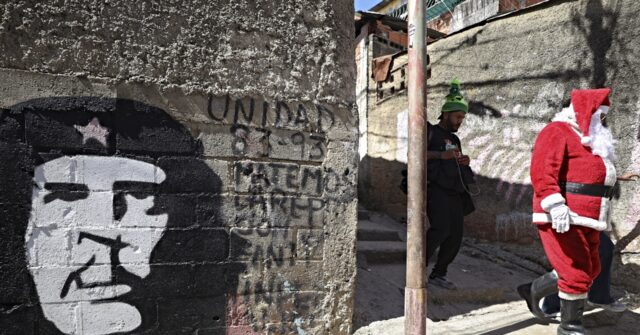Socialist dictator of Venezuela Nicolás Maduro once again unilaterally rescheduled the start of 2025’s Christmas season in Venezuela to begin on October 1.
The Venezuelan dictator claimed during the latest broadcast of his weekly show, With Maduro Plus, on Monday that the decision to reschedule Christmas would bring “benefits for the national economy” and would “defend happiness,” citing some of Venezuela’s musical and culinary Christmas traditions.
“We are going to apply the formula from previous years, which has worked very well for the economy, for culture, for joy, for happiness, and we are going to decree that from October 1st, Christmas in Venezuela will start again,” Maduro announced, “this year too, again, this year Christmas starts on October 1st, with joy, commerce, activity, culture, Christmas carols, gaita, hallaca. Hallaca is the way to defend happiness, the right to happiness.”
Christians in Venezuela, who are majority Catholic, and around the world normally celebrate the Christmas season during a four-week period in December known as Advent that marks the arrival of Jesus of Nazareth on December 25, Christmas Day.
The Venezuelan regime has an extensive record of animosity and threats towards the Venezuelan Catholic Church and has distorted Christian faith to further its socialist agenda throughout the years. One of the more egregious cases took place in 2014, when the ruling United Socialist Party of Venezuela (PSUV), still mourning the death of the “Supreme and Eternal Commander of the Revolution” Hugo Chávez in 2013, rewrote the Lord’s Prayer to worship the late dictator. The socialist bastardization of Christianity’s most important prayer called for Chávez to “lead us not into the temptation of capitalism.”
Throughout his rule, Maduro has repeatedly rescheduled Christmas in Venezuela almost every year to suit his own needs, having first moved it in 2013. As time went on, the practice became more commonplace, with the “start date” changing depending on Maduro’s whims that year.
It is widely believed that the yearly rescheduling of Christmas is a tactic aimed at masking Venezuela’s severe problems caused by the disastrous socialist policies of the Maduro regime. While the Maduro regime spent an undisclosed amount of resource capital on setting up Christmas decorations across Caracas last year, staging them as early as in September, most of Venezuela’s citizens, impoverished by decades of socialism, often find it difficult to partake in their country’s autochthonous Christmas traditions such as the hallaca, the country’s flagship Christmas dish.
The 2025 Christmas rescheduling comes at a time of tension between the Venezuelan socialists and the United States amid President Donald Trump’s efforts to combat drug cartels in Caribbean international waters and curb the flow of drugs entering America. In recent weeks, the United States deployed several vessels and “thousands of troops” to Caribbean international waters as part of the ongoing drug fighting efforts.
Maduro and members of his authoritarian regime claim that the deployment is part of a “narrative” to further a plot by the United States to “invade” Venezuela and oust him from power. Maduro has since launched “preparatory” measures to fight the “invasion.” Last week, Maduro threatened the United States with an “armed struggle” should it attack Venezuela.
Maduro is actively wanted by U.S. authorities on multiple narcoterrorism charges and stands accused of being a leading figure, if not the leader of, the Cartel of the Suns, an international cocaine trafficking operation led by top members of the ruling United Socialist Party of Venezuela and high-ranking Venezuelan military officials. The cartel stands accused of seeking to “flood” the United States with cocaine to harm its people.
In 2024, Maduro also decreed that Christmas should start on October 1. At the time, the dictator claimed that decision was a sign of “gratitude” to Venezuelans after he “won” the July 28 sham presidential election. Maduro proclaimed himself the “winner” of the fraudulent electoral event and launched a brutal repression campaign against peaceful protesters that left at least 25 dead and more than 2,400 unjustly detained, according to U.N. estimates.
At the time, the 2024 “early Christmas” announcement was widely criticized by the Episcopal Conference of Venezuela (CEV), the country’s top ecclesiastical authority, and by international heads of state such as President Javier Milei of Argentina.
CEV released a statement in September 2024 reiterating that Christmas is a celebration of universal character and that the manner and time of its celebration is a matter for ecclesiastical authority. CEV further stressed that Christmas “should not be used for propagandistic or political purposes.”
CEV has not publicly commented on Maduro’s 2025 Christmas rescheduling at press time.
Christian K. Caruzo is a Venezuelan writer and documents life under socialism. You can follow him on Twitter here.
Read the full article here


